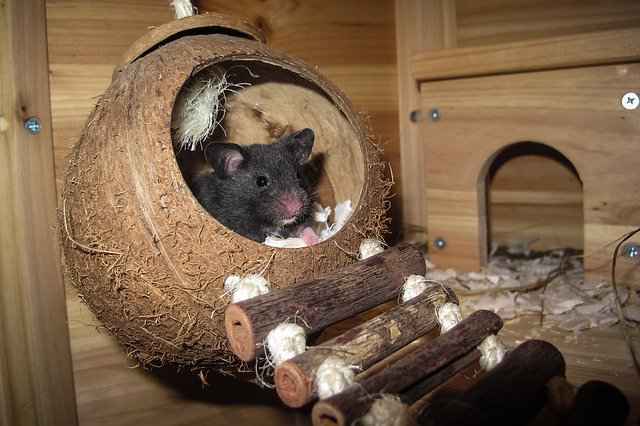Are Hamsters A Good Pet: 24 Hamster Pros & Cons

Pet lovers always ask are hamsters a good pet, In this article, we will outline the major reasons why you should or shouldn’t get a hamster.
Hamsters are not for everyone, but if you are considering them as a pet, these tips will help.
Hamsters are small animals that can be very cute and cuddly.
They make great pets for people who live in apartments or houses without a lot of space.
Hamsters are one of the most popular pet options for both children and adults. They’re small, adorable, and relatively easy to care for.
However, they can also be a little squeaky at night, and their cages carry an odor that can be bothersome for some people.
So are hamsters good pets? Well, they can be!
Here, we will explore whether hamsters make good pets and give you some tips to keep in mind if you’re considering adopting one.
Are Hamsters A Good Pet?
Hamsters are popular pets among many people, and they don’t need much care. Hamsters get adequate exercise when running on their wheel, and are cute, soft, and fun to hug. They can be an excellent first pet for certain children. Hamsters, on the other hand, do not come with care instructions.
There are many reasons why someone might choose to buy a hamster as a pet.
Whether you want an animal that is low maintenance or one that will be as social as possible, there are many reasons for picking this small mammal.
Additionally, some people might find themselves more drawn to the idea of owning a hamster than a cat or dog for various reasons.
However, owning and caring for a hamster also has its own set of challenges that may not be immediately apparent.
One of the best ways to keep your hamster happy and healthy is to provide lots of safe fruits for hamsters as treats.
This article will cover the pros and cons of owning a hamster so that you can make a more informed decision about whether or not this is the right pet for you.
Are hamsters good pets for children?
A kid under the age of six may be unable to properly manage a hamster, which requires a soft touch and a supporting grasp.
Hamsters are excellent pets for school-aged children because, despite their minimal maintenance requirements, they are a lot of fun to play with and watch, and they are highly engaging with people and their surroundings.
While many people maintain hamsters as pets, the truth is that they are most commonly kept by youngsters.
They may teach youngsters about duties toward living things, the necessity of keeping the cage clean, and the advantages of patience while taming their pet in this environment.
Hamsters as pets pros and cons
Here are some pros and cons of hamsters, which is what to consider before answering the question are hamsters a good pet:
Hamsters are playful and adorable
Hamsters are considered by many pet lovers as one of the most playful and adorable pets to own.
Standing close to your hamster cage and watching your hamster play around with hamster wheel relief stress.
When you are stressed out from work, and you get home, you need to feel better! Just stand close to your hamster and watch it play.
Most hamsters are so adorable that you might want to stay and cuddle or play with them all day long.
Hamsters are inexpensive pets to own
Aside from being low-maintenance, a hamster is also inexpensive.
Despite the fact that you must include in the whole cost of all the items required to care for a happy hamster, the ultimate cost will be far less than adopting a cat or dog.
Hamsters are quite inexpensive to keep once the initial one-time expenditures, such as the cage, are met.
You won’t be spending much on hamster food, snacks, or bedding each month.
Of course, as with any pet, there may be unexpected expenditures, like vet fees, for which you must budget.
Hamsters are very friendly
Are you looking for a pet that will never get mad at you? Then you should check out a hamster.
Golden hamsters establish deep relationships with their owners once they have been properly hand-tamed.
They rely on their owners for company and contact, while not enjoying the company of other hamsters.
Chinese hamsters can develop strong attachments to their owners, yet they can also flourish in groups (unlike the Golden).
The Golden hamster’s larger size also makes it simpler to manage than the lesser types.
Hamsters are a very clean pet
Do you need a pet that you won’t wake up early morning to start cleaning litter boxes or cleaning up poop? Then you need a hamster.
Unlike most other rodents, hamsters only have one toilet in their cage, making them very easy to clean.
They are also meticulously clean, always fussing with their fur. This eliminates the need for their human companions to conduct any pet washing.
Hamsters spend lots of time cleaning themselves up, and you see them looking clean always.
Hamsters don’t make loud noises
Do you live in a city where your neighbors don’t like or always complain of pet noises? Then hamsters are the right pet for you.
Hamsters are known to be calm and noiseless pets, they don’t bark or meow, like other pets.
In some states, people don’t owner pets because of the noise, in the case of hamsters you won’t notice their presence because they don’t make loud sounds.
Hamsters don’t require professional grooming services
Are you the type that doesn’t like sitting down and brushing your pet every day? Then hamsters are right for you.
Hamsters groom themselves often, sometimes many times each day.
Bathe, comb, or otherwise supplement your pet hamster’s grooming routine is unnecessary.
Unlike dogs and cats, hamsters don’t require a professional groomer and can do the grooming job themselves.
Hamsters don’t require constant attention
Hamsters are typically pleased to be left alone in their cage, even if they may enjoy quality playing with their owners if they have adequate space and amusing toys.
To care for a happy hamster, you don’t need time for training, regular walks, or extensive grooming sessions.
They don’t require the same level of human connection as dogs and cats.
However, failing to socialize your hamster (particularly early in its life) may cause it to be more shy or afraid to be touched.
Hamsters don’t require daily cleaning of their cage
Are you looking for an adorable pet that you won’t be working on its cage every day? Then hamsters got you covered on that.
You should spot-clean your hamster’s bedding (removing excrement) once a week, and change her whole bedding once a month, depending on the sort of cage you keep her in.
This is less work when you consider that pets like cats should have their litter boxes clean up every day, which is more time-consuming.
Hamsters don’t require daily walks by their owner
Are you looking for a pet that can get its daily needed exercises on its own? Then hamsters got you covered.
Hamsters require exercise on a daily basis. But the good thing is that you can get a hamster wheel for them to run with.
Consider purchasing her a hamster ball to run in if her cage doesn’t have a wheel for her to run on. But, no matter what you do, never leave your hamster alone in a ball.
Hamsters are not like dogs or cats that you need to leash train and walk them daily for needed exercises.
Hamsters don’t require extensive training
Hamsters, unlike cats and dogs, do not require considerable training.
There’s no need for litter box training or obedience classes!
Hamsters, on the other hand, benefit from regular touching and socialization to let them come to know you.
A hamster might be the perfect pet for you if you want a low-maintenance fuzzy friend.
Hamsters require minimal space
Unlike birds, snakes, dogs, cats, or even rabbits, hamsters only require a few square feet to live comfortably.
A hamster cage may easily fit on a desk or bureau, making it an ideal pet for individuals who live in tiny houses or apartments.
However, don’t be afraid to take your hamster out for some exercise on a regular basis.
Hamsters like exploring when they are supervised.
Getting them a hamster ball is an excellent method for them to expend some energy. They’re also a lot of fun to watch roll about.
Hamsters do not shed like cats and dogs
Hamsters do not shed, therefore if you have a fur allergy, a hamster should be fine for you.
There will be no need to brush your clothes or furnishings on a regular basis since there will be no stray hamster hairs.
The only ‘mess’ a hamster will produce in your home is stray bits of bedding in weird locations, but that is the limit of the ‘mess’ a hamster will make.
Hamsters are generally healthy
Are you looking for a pet that won’t drag you to the vet on a monthly basis? Then hamsters got you covered.
As long as they are housed in a proper cage and provided a good meal, these little rodents are typically healthy during their brief lifetimes.
The most serious danger they face is receiving injuries as a result of falling, therefore they must be handled with caution.
Let’s talk about hamster cons
Here are some cons of owning a hamster, which is as follows:
Buying and setting up a hamster cage can be expensive
Building a cage for your hamster is not free, it comes with a small cost and the cost depends on the size of cage you want.
Buy all the necessary things you need to own and keep a hamster happy and healthy comes with an initial cost.
However, this cost depends on what you want, but no matter what, you will surely spend some cash to get things together.
Hamster veterinarian are difficult to find
A hamster is an exotic animal that requires the attention of a veterinarian who is familiar with exotic animals.
Because not all vets treat hamsters, it may be difficult to obtain treatment if yours becomes unwell.
Exotic-animal veterinarians may also be rather expensive, so consider if you have an exotic veterinarian in your area before getting a hamster.
Hamsters are great at escaping
Just when you are beginning to enjoy the company of your hamster, all of a sudden your hamster can escape, and most times you will not find them again.
These clever creatures can flatten their bodies to squeeze through even the tiniest of openings.
They might quickly get disoriented and difficult to locate. They are frequently injured or killed while on the loose.
So, to avoid emotional break down of loosing your hamster be sure to keep no room for escape.
Hamsters are easily frightened by noise
Because hamsters’ vision is poor, they rely on their other senses to survive. They may bite to protect themselves if they are caught off guard.
Hamsters are among pets that don’t do well with loud sounds or noises and can bite if you are holding them before a loud sound is made.
Hamsters are easily frightened by noises, and they think biting is a way of defending themselves from trouble.
So when you are playing with your hamster, always try to avoid unnecessary or sudden loud sounds or noises.
Hamsters don’t live very long
This is one of the biggest cons of having a hamster as a pet, they don’t live for long like cats and dogs.
Even under ideal circumstances, hamsters only survive for two to three years, which is a terrible fact.
Hamsters have a short lifespan of two to three years. This indicates that the owner will be saddened by the animal’s death after only a short amount of time.
For youngsters, this may be very stressful and traumatic.
It is always emotional to see or learn that your hamster lives for short and will not be with you for more than 5years maximum.
Hamsters stay up late at night
Hamsters are active at night (from around 8 pm, but sometimes later), and This is a big con for most hamster owners.
The most active time for hamsters is at night. For children who want to play with them during the day, this might be aggravating.
The hamsters like to snooze during the day. It’s critical to understand and accept that their nocturnal activities may cause you to lose sleep.
Many individuals who adopt hamsters as pets do not consider the animal’s nocturnal habits.
These rodents will spend most of the day curled up sleeping, and if disturbed, they will become hostile and bite.
Hamsters often get diseases
Due to over breeding, hamsters are more prone to develop heart failure at an early age. This painful illness can be expensive to treat, and there is no cure.
Other illnesses and infections, some of which can infect people, are also more common in hamsters.
Hamsters are susceptible to illnesses and viruses, which may deter some parents from keeping them as children’s pets.
Most diseases associated with hamsters are:
- Salmonella bacteria: This can cause stomach cramps, diarrhea, and fever.
- Lymphocytic choriomeningitis and hantavirus: These viruses can be transmitted from hamsters to humans.
Hamsters can be noisy with their wheels at night
This depends on the location of your hamster cage, but one is sure, hamsters get noisy on wheels at night.
Hamsters sleep during the day and stay up at night, meaning they will play with their toys at night, and this can be a bit loud.
You will surely be hearing the sound of their wheels if you pay attention as they are running on it.
Hamsters are not good for kids under the age of 4 years
Hamsters can bite a lot when they are not properly handled and this makes them unsafe for kids under 4 years of age.
Hamsters require minimal handling, which kids under 4 years can’t provide, unlike dogs that can play with kids under 4 years.
Therefore, hamsters are better with teens and adults and not kids.
Hamsters require large cages
The bigger, the better, hamsters require large cages to stay happier this is because they need to run around a lot.
Hamsters are full of energy and need activities to help them stay healthy and happy, which means you have to provide large cages.
The larger the cage, the more money.
Hamsters are not good for cuddlers
Are you looking for a pet that will be interesting and cuddling, then hamsters are not for you.
Hamsters are pets that want to be on their own and not your topical cuddle monsters like cats or dogs.






